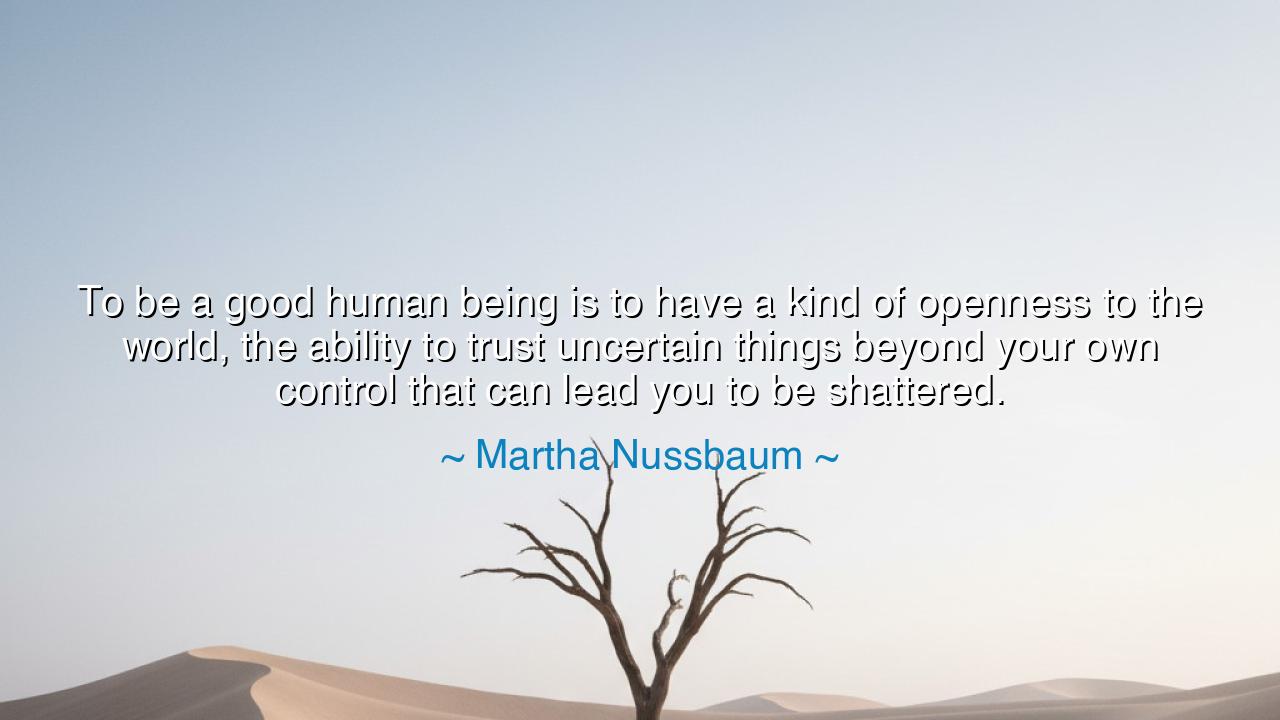
To be a good human being is to have a kind of openness to the
To be a good human being is to have a kind of openness to the world, the ability to trust uncertain things beyond your own control that can lead you to be shattered.






Hear, O seeker of wisdom, the solemn voice of Martha Nussbaum, a philosopher of our age, who declared: “To be a good human being is to have a kind of openness to the world, the ability to trust uncertain things beyond your own control that can lead you to be shattered.” These words, like a double-edged sword, speak of both beauty and pain. For they remind us that the path of goodness is not armored with certainty, nor shielded from sorrow. It is a path of risk, of vulnerability, of trust in what is fragile and uncertain.
The origin of this wisdom lies in the human condition itself. From the time of the ancients, thinkers wrestled with the tension between security and openness. The Stoics sought invulnerability, teaching that the wise man should not be shattered by fate. But Nussbaum, standing in the line of Aristotle and the tragedians, proclaims a different truth: that to be fully human, one must embrace the very things that can wound. Love, compassion, trust—these are uncertain and beyond our control, yet without them, life is but a barren fortress.
Consider the tale of Antigone, the daughter of Oedipus, who chose to honor her brother with burial rites despite the decree of the king. She trusted in divine law, in love for her family, though it led to her destruction. She was shattered, yes, but her courage and openness made her noble. Had she sought only safety, she would have lived longer, but lesser. This is the paradox Nussbaum unveils: the greatness of being human is inseparable from the willingness to risk suffering for the sake of love, truth, and goodness.
History too testifies to this. Think of Martin Luther King Jr., who placed his trust in the uncertain dream of justice, knowing it might bring imprisonment, violence, even death. He did not close himself to the world in fear, but opened himself, and though he was indeed shattered, his openness gave birth to movements of freedom that outlived him. This is the pattern of the truly good: they accept the risk of being broken, because in that risk lies the possibility of creating light for others.
Yet Nussbaum’s words are not only for the heroes of history. They are for every soul. To be a parent is to trust uncertain things—you pour your heart into a child who may stumble, who may stray, who may break your heart. To love a friend or a partner is to risk betrayal, distance, or loss. But to refuse such openness is to close the gates of your soul, to live unshattered perhaps, but also unfulfilled. To be good is to live vulnerably, because only vulnerability allows true connection.
The lesson, O listener, is thus: embrace uncertainty, not with recklessness, but with courage. Do not cling to control as though it were your salvation, for control is an illusion. Trust in life, trust in love, trust in the bonds that cannot be guaranteed. You may be wounded, you may be shattered, but in the very shattering, you become more deeply human, more capable of compassion, more able to lift another who suffers.
Practical wisdom follows: practice openness each day. Listen before you judge. Love without demanding guarantees. Give kindness even when it may not be returned. Step into ventures that may fail, yet hold the possibility of beauty. For to live locked away from risk is to live half-dead; but to live open is to live fully, even if it breaks you.
So remember Nussbaum’s teaching: the measure of a good human being is not found in safety or in mastery, but in openness to the fragile, uncertain, and uncontrollable. To live this way is to stand exposed to pain, but also to joy. And though you may be shattered, it is better to be broken in love than unbroken in emptiness. For in the cracks of the shattered soul, the light of true humanity shines brightest.






AAdministratorAdministrator
Welcome, honored guests. Please leave a comment, we will respond soon